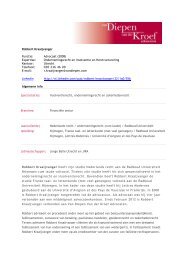© Van Diepen Van der Kroef Advocaten
© Van Diepen Van der Kroef Advocaten
© Van Diepen Van der Kroef Advocaten
- No tags were found...
Create successful ePaper yourself
Turn your PDF publications into a flip-book with our unique Google optimized e-Paper software.
view of, inter alia, the manner in which the norm of Article 105 paragraph 1 of the UNCharter, was detailed in the Convention, it is in principle not at the discretion of anational court to give its opinion on the “necessity” of the UN actions within the functionalframework described 5.12. A comprehensive, “full” review on the merits is also contraryto the ratio of the immunity of the UN as enshrined in international law. The Courtsubscribes to the State’s assertion that also for this reason domestic courts should assessthe acts and omissions of UN bodies on missions such as the one in Bosnia-Herzegovina onlywith the greatest caution and restraint. It is very likely that any more far-reaching reviewwould have huge consequences for the Security Council’s decision-making on similar peacekeepingmissions.’Explanation of ground of appeal 8103. Legal consi<strong>der</strong>ation 5.14 elaborates on legal consi<strong>der</strong>ation 5.12 of the District Court. It wasraised frequently in the ground of appeal developed in response to legal consi<strong>der</strong>ation 5.12that the review standard should be whether the immunity claimed is necessary for thefulfilment of the purposes set out in Article 1 of the UN Charter. The United Nations were inno sense impeded in carrying out their duties by the fact that an independent courtreviewed ex post facto the contested conduct of the United Nations. The Association et al.refers in this context also to Section 29 of the Convention, which prescribes a legal remedy.It follows from that that it was foreseeable and not contrary to legal certainty that theconduct of the UN would be reviewed by an independent court.104. The District Court erroneously held that the Association et al. would argue that the Courtpetitioned must review whether the disputed conduct was actually necessary. TheAssociation et al. has not argued that (as a result of which the view of the District Court iserroneous) and that is also not the position at law. The Association et al. argued thatimmunity exists insofar as a functional necessity for it exists. It is not the conduct itself butthe immunity for that conduct that must be necessary. The legal basis for such a reviewarises from Articles 1 and 105 paragraph 1 of the UN Charter. It is the necessity forimmunity that should have been the issue not the necessity for the conduct.<strong>©</strong> <strong>Van</strong> <strong>Diepen</strong> <strong>Van</strong> <strong>der</strong> <strong>Kroef</strong> <strong>Advocaten</strong> page 45 of 99
















